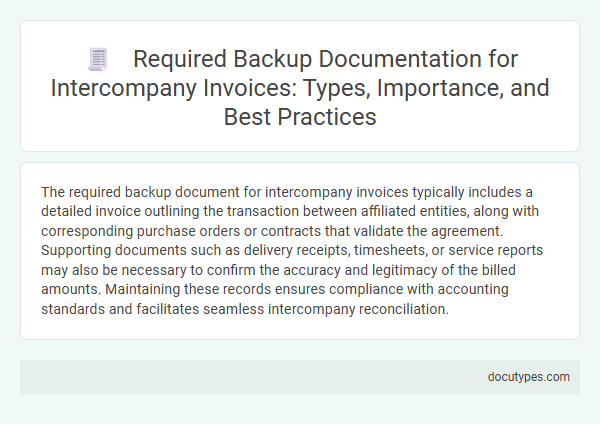The required backup document for intercompany invoices typically includes a detailed invoice outlining the transaction between affiliated entities, along with corresponding purchase orders or contracts that validate the agreement. Supporting documents such as delivery receipts, timesheets, or service reports may also be necessary to confirm the accuracy and legitimacy of the billed amounts. Maintaining these records ensures compliance with accounting standards and facilitates seamless intercompany reconciliation.
Introduction to Intercompany Invoice Backup Documentation
Intercompany invoices are essential financial documents exchanged between related entities within the same corporate group. Proper backup documentation ensures accuracy and compliance in these transactions.
The required backup document typically includes a detailed invoice copy outlining goods or services rendered. Supporting documents such as purchase orders, delivery receipts, and approval records are also crucial for validation.
Types of Required Backup Documentation
Intercompany invoices require specific backup documentation to ensure accuracy and compliance. These documents provide proof of transactions between affiliated entities within the same organization.
Types of required backup documentation include purchase orders, which authorize the transaction, and delivery receipts that confirm the goods or services were received. Invoices should be accompanied by contracts or agreements outlining the terms of the intercompany transaction. Payment records or bank statements may also be necessary to verify the completion of the payment process.
Importance of Backup Documentation for Intercompany Invoices
What is the required backup document for intercompany invoices? Backup documentation typically includes purchase orders, contracts, and approval forms that verify the legitimacy of each transaction. Proper documentation ensures accuracy, compliance, and smooth audit processes for your financial records.
Supporting Contracts and Agreements
Intercompany invoices must be supported by proper backup documents to ensure compliance and accuracy. Supporting contracts and agreements serve as essential backup documents for these transactions.
- Supporting Contracts - These are formal agreements detailing terms, pricing, and conditions between related entities.
- Signed Agreements - Documentation signed by authorized representatives validating the intercompany transaction.
- Contract References - Invoices should clearly reference the applicable contract or agreement for audit and verification purposes.
Your backup documents help validate the legitimacy of intercompany invoices, facilitating smoother audits and accounting processes.
Proof of Delivery or Service Completion
The required backup document for intercompany invoices is typically the Proof of Delivery or Service Completion. This document verifies that the goods were received or the services were successfully performed between the affiliated entities. You must ensure this proof is accurate and available to support the invoice for auditing and compliance purposes.
Pricing and Transfer Pricing Documentation
The required backup document for intercompany invoices primarily includes detailed pricing agreements that comply with arm's length principles. Transfer pricing documentation must clearly justify the transaction values between related entities to ensure tax compliance and avoid penalties. Proper documentation typically involves intercompany agreements, benchmarking studies, and transfer pricing reports to support the invoiced amounts.
Tax Compliance and Regulatory Documentation
Proper backup documentation for intercompany invoices is essential to meet tax compliance and regulatory standards. You must retain specific documents to ensure audit readiness and legal adherence.
- Intercompany Invoice Copy - A detailed and signed copy of the intercompany invoice serves as the primary evidence of the transaction.
- Transfer Pricing Documentation - Documentation supporting the pricing method used validates that the intercompany charges comply with tax laws.
- Tax Registration and Compliance Certificates - Copies of relevant tax registration certificates confirm the legitimacy of your business entities involved in the transactions.
Best Practices for Organizing Backup Files
The required backup document for intercompany invoices typically includes the original purchase order, invoice copy, and any relevant correspondence supporting the transaction. These documents validate the intercompany charges and ensure compliance with accounting standards and audit requirements.
Best practices for organizing backup files involve categorizing documents by date, invoice number, and involved entities to facilitate quick retrieval during audits. You should maintain digital copies in a secure, centralized system with proper access controls to protect sensitive financial information.
Common Pitfalls and How to Avoid Them
Accurate backup documentation is essential for validating intercompany invoices and ensuring compliance with accounting standards. Missing or incorrect documents often lead to audit issues and delayed payments.
- Invoice Copies - Maintain clear and complete copies of all intercompany invoices for audit trails and reconciliation purposes.
- Transfer Pricing Documentation - Provide detailed transfer pricing reports to justify the pricing between related entities and satisfy tax authorities.
- Approval Records - Retain authorization evidence from relevant departments to confirm transaction legitimacy and prevent internal control failures.
What Is the Required Backup Document for Intercompany Invoices? Infographic

